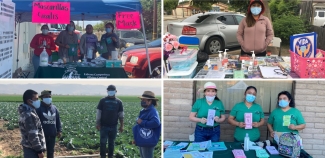Partner Spotlight: Lideres Campesinas of California
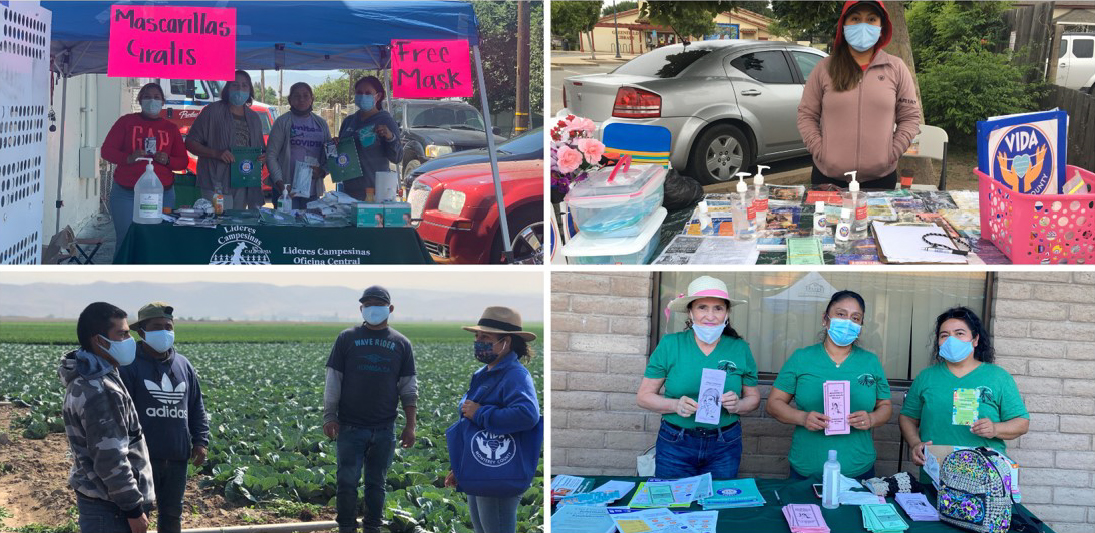
[Editor’s Note: Since July 2021, Alianza Nacional de Campesinas, Migrant Clinicians Network (MCN), Rural Coalition and 20 organizational partners and members have mobilized 221 community health outreach workers across 20 states and Puerto Rico to encourage vaccination within Black, Indigenous, and people of color rural communities through a learning collaborative. Funded by an $8.1 million grant from the Health Resources and Services Administration (HRSA), the effort aims to raise vaccination rates among immigrant and migrant farmworkers and rural communities of color through reinforcing COVID-19 information, addressing vaccine hesitancy and accessibility, and assisting in countering misinformation and disinformation.]
At the edges of a vast field on a warm Southern California evening, a masked clinician prepares to give COVID-19 vaccinations at a pop-up clinic aimed to meet the needs of the farmworkers that feed the nation. Bringing vaccinations to farmworkers is a key part of Lideres Campesina's (Lideres) “Take it to the Fields Initiative,” just one of several strategies the nonprofit has enacted since COVID began to empower the migrant and immigrant women farmworkers they seek to serve. This organization has worked for over three decades to help farmworker women and girls in California know how they can stand up for themselves, represent their communities, and advance their own interests for a better future.
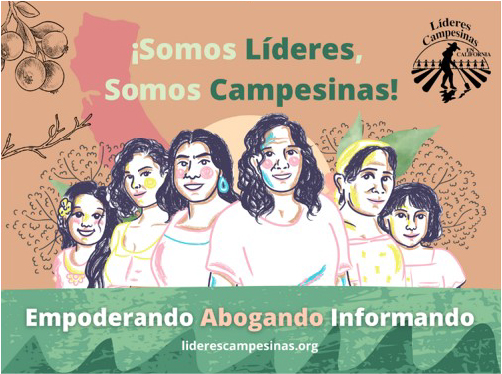
Lideres works both on policy issues, such as worker protection and the banning of certain agricultural pesticides like glyphosate, known by the brand name RoundUp, as well as social issues, giving women the tools to stand up to workplace sexual harassment and advocate for themselves on issues of payment and wage theft. The organization operates primarily in the southern half of California, where large stretches of sunny agricultural land lies on the outskirts of major metropolitan areas. Lideres began in 1988 in Coachella Valley and since has grown into an organization with more than 285 members across 14 different California communities.
In the past two years, the organization has had to refocus on COVID-19 and protecting vulnerable farmworkers and their families from the pandemic. Lideres goes to community hubs like a few key grocery stores where farmworkers cash checks and shop at the end of the workweek, handing out information, answering questions from community members, and providing masks to community members.
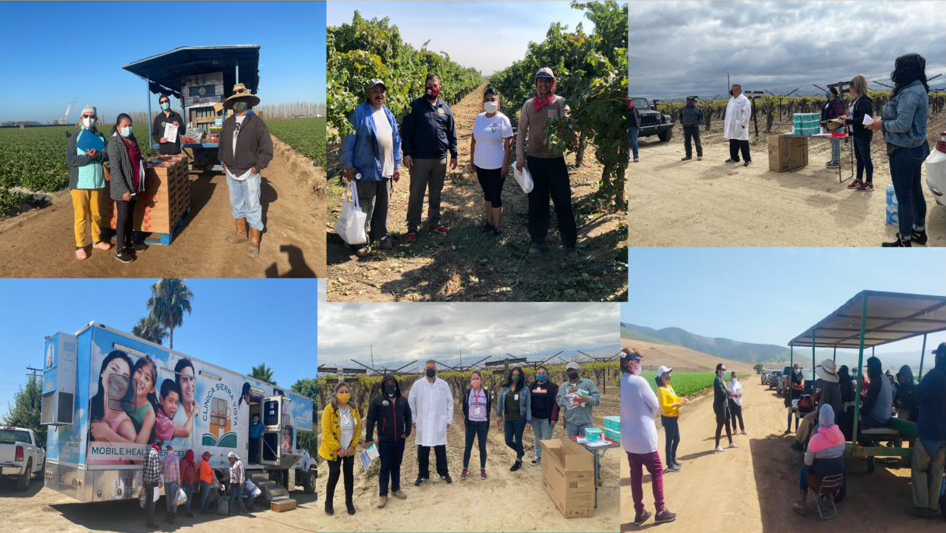
Lideres’ Take it to the Fields Initiative has been one of their most effective strategies to address the pandemic. By utilizing mobile clinics and working with local clinicians, the organization brings vital resources to farmworkers at their workplace, vaccinating those who have not yet been able to get their vaccines and distributing masks. This strategy reduces the effort by farmworkers to protect themselves and makes vaccination as accessible as possible. It also brings a clinician that can answer common questions and pressing concerns to the field. Nurses and doctors are generally well-trusted messengers on issues of vaccine safety and can help to relieve doubts and concerns among workers who may have been hesitant to get vaccinated before.
Lideres has also held bilingual town halls with clinicians, making it easier for Spanish speakers to get evidence-based information about COVID-19, its variants, and the vaccines to protect against the virus. Lideres also uses these town halls and their other means of communication to fight misinformation in their communities. Lideres, like many of our partners that participate in the MCN led learning collaborative, has struggled with misinformation.
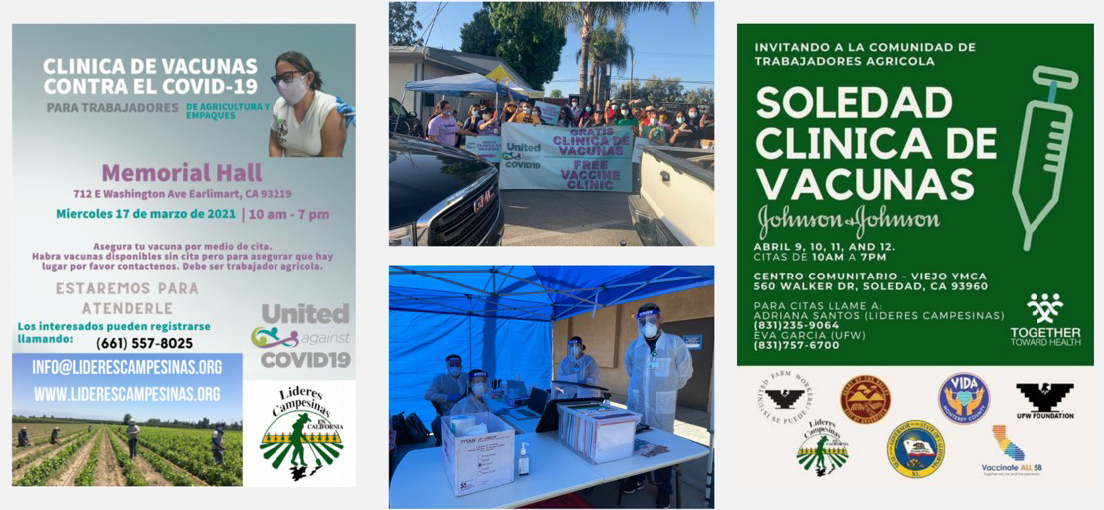
Their work on COVID is not just limited to providing resources. Lideres has gotten involved in issues of policy, putting pressure on Governor Gavin Newsom of California to respond to major concerns among farmworkers and suggesting meaningful policy changes to address the concerns. Lideres has also been featured in several major news outlets, including the Washington Post, Univision, and the Guardian, allowing them to share their message and the struggles of rural, farm working women widely.
Through their long history of empowerment and political activism, Lideres has effectively made a name for itself in its community, making them effective at reaching farmworkers in the fields and politicians in their office. Their work in relation to the Learning Collaborative has helped to inform effective practices in farm working communities, where practices like the “Take it to the Fields Initiative” can serve as an example of how individuals can effectively reach farmworkers and help get them vaccinated.
Each week, MCN facilitates a bilingual Learning Collaborative that offers partners access to clinical staff, other experts, an extensive library of fully editable COVID-19 resources, evidence-based COVID-19 updates, and extensive communications and marketing technical assistance to support partners’ use and adaptation of resources to fit their community’s needs. Each organization shares learning collaborative content and activities with their frontline community health workers, who tirelessly promote COVID-19 vaccination in the counties, towns, and neighborhoods where they live. This blog series highlights best and promising practices used by grant partners across the country, which are shared at the learning collaboratives, creating a diverse learning environment.
This is supported by the Health Services and Resources Administration (HRSA) of the U.S. Department of Health and Human Services (HHS) as part of an award totaling $8,105,547 with 0% percentage financed with non-governmental sources. The content are those of the author(s) and do not necessarily represent the official views of, nor an endorsement, by HRSA, or the U.S. Government. For more information, please visit HRSA.gov.
Got some good news to share? Contact us on our social media pages above.
Return to the main blog page or sign up for blog updates here.
- Log in to post comments
